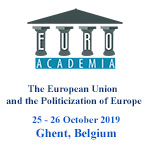Euroacademia Conferences
 Europe Inside-Out: Europe and Europeanness Exposed to Plural Observers (9th Edition) April 24 - 25, 2020
Europe Inside-Out: Europe and Europeanness Exposed to Plural Observers (9th Edition) April 24 - 25, 2020 Identities and Identifications: Politicized Uses of Collective Identities (9th Edition) June 12 - 13, 2020
Identities and Identifications: Politicized Uses of Collective Identities (9th Edition) June 12 - 13, 2020 8th Forum of Critical Studies: Asking Big Questions Again January 24 - 25, 2020
8th Forum of Critical Studies: Asking Big Questions Again January 24 - 25, 2020 Re-Inventing Eastern Europe (7th Edition) December 13 - 14, 2019
Re-Inventing Eastern Europe (7th Edition) December 13 - 14, 2019 The European Union and the Politicization of Europe (8th Edition) October 25 - 26, 2019
The European Union and the Politicization of Europe (8th Edition) October 25 - 26, 2019 Identities and Identifications: Politicized Uses of Collective Identities (8th Edition) June 28 - 29, 2019
Identities and Identifications: Politicized Uses of Collective Identities (8th Edition) June 28 - 29, 2019 The European Union and the Politicization of Europe (7th Edition) January 25 - 26, 2019
The European Union and the Politicization of Europe (7th Edition) January 25 - 26, 2019 7th Forum of Critical Studies: Asking Big Questions Again November 23 - 24, 2018
7th Forum of Critical Studies: Asking Big Questions Again November 23 - 24, 2018 Europe Inside-Out: Europe and Europeanness Exposed to Plural Observers (8th Edition) September 28 - 30, 2018
Europe Inside-Out: Europe and Europeanness Exposed to Plural Observers (8th Edition) September 28 - 30, 2018 Identities and Identifications: Politicized Uses of Collective Identities (7th Edition) June 14 - 15, 2018
Identities and Identifications: Politicized Uses of Collective Identities (7th Edition) June 14 - 15, 2018
Europe and the ‘Other’ [Pakistan]: Deconstruction of the Dominant Culture by the ‘Other’
-
-

-
Presentation speakers
- Katherine Peters, Faculty of Arts, Design and Technology, University of Derby, Derby, United Kingdom
- Download presentation
Abstract:
Bakhtin in The Dialogic Imagination states, dialogic work carries on a continual dialogue with other works of literature and other authors, even all language and all thought appeared dialogic to Bakhtin (Bakhtin, 1981). In this paper, the short poem, ‘Wasteland’ (1977) selected from her first collection Khushboo (Fragrance 1977), has been chosen for primary analysis. The poem written by Shakir in the twentieth century, under the influence of T.S.Eliot’s poem ‘The Waste Land’ (1971) also written in the twentieth century, gives Shakir a chance to have a dialogue with her own culture on the one hand, and with the English culture on the other. She revisits the same theme of sterility and futility, but she talks with reference to her context, as a suppressed woman, living in a hostile patriarchal Muslim society; a woman without love; without sexual fulfilment; her body is sterile and as such her existence futile. The paper is an effort to translate to English audiences how Shakir, in her role as a teenage lover, borrows a voice, such as T.S.Eliot’s and argue that while Eliot’s poem meant to reflect sexuality in the Modern scenario as a depleted force (Gibson 1988), and while the worldly claims clash with his religious aspect; Shakir on the contrary finds sexuality as a driving force and wrote the poem because the religious and cultural claims clashed with her natural desire as sex; a desire of a young girl inside her. The paper will look at the intertextuality used by Shakir to examine how it connects the ‘Other’ east with the west and bridges the invisible divide of cultures, framing, what Mary Louis Pratt terms as transculturation (1999). The paper will also underline how the dialogic engagement deconstructs the dominance of the European culture when Shakir incorporates English themes into her eastern Pakistani culture and thus contaminates the supremacy of the west. The concept of hybridity, as framed by Bhabha, will also be applied as Shakir merges the western thought into eastern thought in the poem ‘Wasteland’.
-
Related Presentations

Does Liberalism Need a Bit of Despotism?
- Matteo Rategni

Visibility Hierarchies: Santiago Sierra and the Homo Sacer
- Pedro David Massena Carreiro













